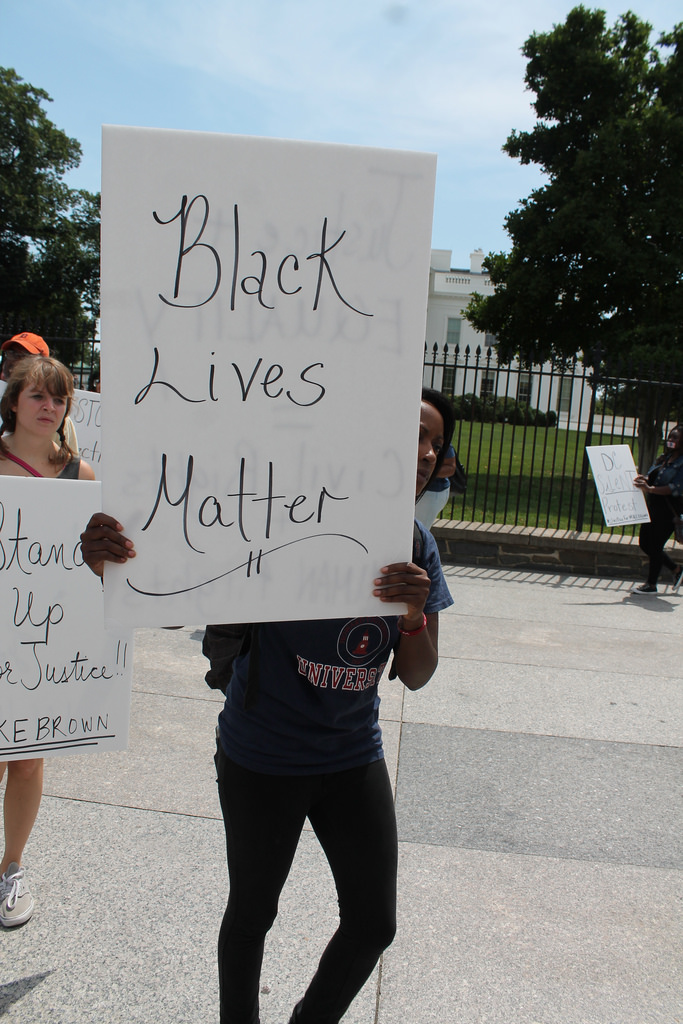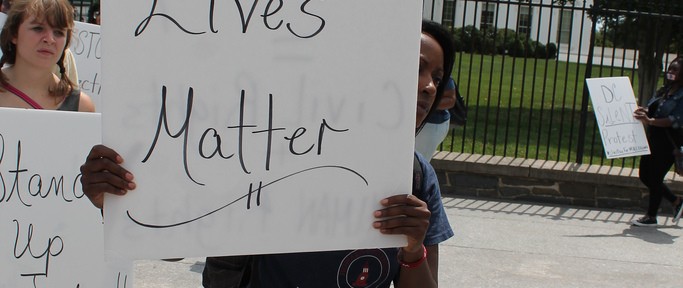
Justice for Mike Brown: Anti-Police Brutality Silent Protest, in front of the White House on Saturday, August 16. (Source: Elvert Barnes on Flicker. Some rights reserved.)
I am 17 years old and I know that I have a bright future ahead of me. The only thing I don’t know is if it’ll be taken away from me by authority figures such as the police.
Oscar Grant was in the midst of changing his life around but the new future he had was stripped by BART police.
Eric Garner was a loving dad who lost his life in a chokehold performed by a group of NYPD officers.
Ezell Ford had a promising future but was shot down by LAPD officers.
We all know about Rodney King and his beating.
Michael Brown would have been educating himself at college this week but he didn’t get to take a single class.
At some point our nation needs to really think about the bigger picture at hand. The race issue is indeed an issue but the bigger issue is not white against black; the bigger issue is right against wrong. I feel that the world that we live in is very wicked if we cannot feel protected by those who are supposed to “serve and protect us.” How many more people have to be killed for us to see that injustice exists? How many tears have to be shed for us to see that something is wrong?
How many more people have to be killed for us to see that injustice exists?
Beautiful lives have been taken away by ugly spirits and to add insult to injury, little consequences have been ordered for those responsible. In fact, officers receive administrative leave for killing innocent souls. That’s the scariest thing to me.
But we must not act out of emotion — that’s exactly when we see our opinions ignored. It seems to me that the only way to get something changed in America is through litigation. We must come up with laws that allow us to hold the murderers of innocent lives accountable.
Dr. Martin Luther King, Jr.’s words ring deeply true to me: “Discrimination is a hellhound that gnaws at Negroes in every waking moment of their lives to remind them that the lie of their inferiority is accepted as truth in the society dominating them.”
We have been asking for justice since 1619 when slavery came to America. All I’m asking for is peace and harmony for ethnic minorities.
Editor’s note: Damani Jasper’s opinion piece is a powerful example of how young men of color are affected by Michael Brown’s shooting. APAGS readers might find these links helpful:
- An APA blog post discussed how to talk to youth about events like these.
- APA summarized and linked to psychological research on racial stereotypes and threat assessment in an August 14th statement on Brown’s death.
- Dr. Keita, head of APA’s Public Interest Directorate, blogged about the need for dialogue on race, prejudice, and stereotyping after the acquittal of Trayvon Martin’s shooter.
 Damani aspires to be an orthopedic surgeon. He completed a fellowship at APA and previously blogged about student debt.
Damani aspires to be an orthopedic surgeon. He completed a fellowship at APA and previously blogged about student debt.


You paint a great picture of good men being unjustly killed by police brutality; however, they were not all good men. This DOES NOT justify police brutality, but I don’t understand why society insists on portraying these individuals as completely innocent. Michael Brown, may have had every intention of attending college, but he also robbed a store in mid-day light. He DID NOT deserve do die for this crime; however, we should not have to lie about the character of a person to insist on just treatment of everyone, even the guilty, from our local police force. Everyone, even the most horrid criminals, should be treated fairly and afforded their day in court.
There was no solid evidence to prove that he actually robbed that store. Surveillance cameras are very controversial. Lastly, no human being is in a position to say whether a man is “good” or bad.
We can agree to disagree on the video since that isn’t my point. The point is that he character should not play a role in his treatment. Everyone, good and bad, are entitled to humane treatment and a fair trail. We should not have to justify a persons right to those two things.
Jolene, I agree that we need to entitle all people (even his killer) fairness in the judicial system. We are clearly very far from that – Michael Brown will never be tried for any possible robbery he did or did not commit (although the public is doing a heck of a job trying him for his own murder.) I guess I wonder, why do we choose to discuss, debate, or dismiss anyone’s character – and what is the significance of doing so when the power differential between a white police officer and a poor black boy are so glaring? Are we really “character-blind” in this situation? How about “color-blind?” I would bet that many who choose to focus on (or proclaim to ignore) Michael Brown’s character flaws don’t apply the same rules to the officer who killed him.